人教版(2019)选择性必修第二册 Unit2 Bridging Cultures Reading and_thinking词汇详解课件(共21张PPT)
文档属性
| 名称 | 人教版(2019)选择性必修第二册 Unit2 Bridging Cultures Reading and_thinking词汇详解课件(共21张PPT) | 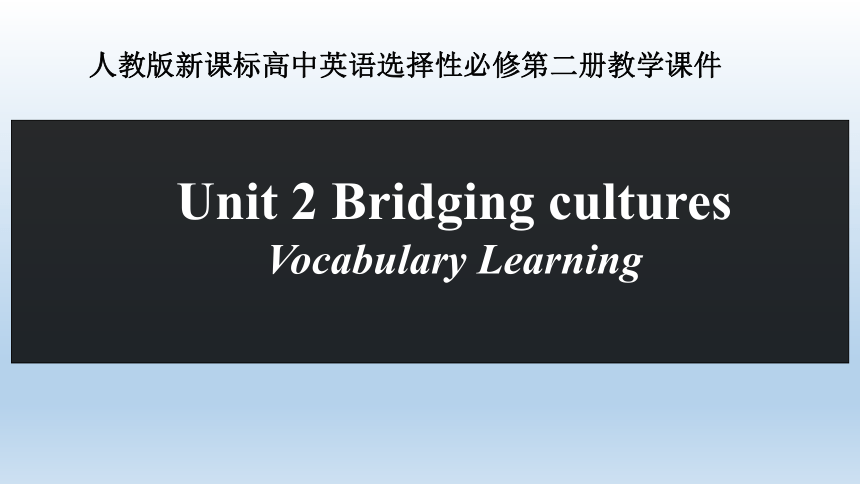 | |
| 格式 | pptx | ||
| 文件大小 | 2.9MB | ||
| 资源类型 | 教案 | ||
| 版本资源 | 人教版(2019) | ||
| 科目 | 英语 | ||
| 更新时间 | 2023-03-12 13:57:53 | ||
图片预览

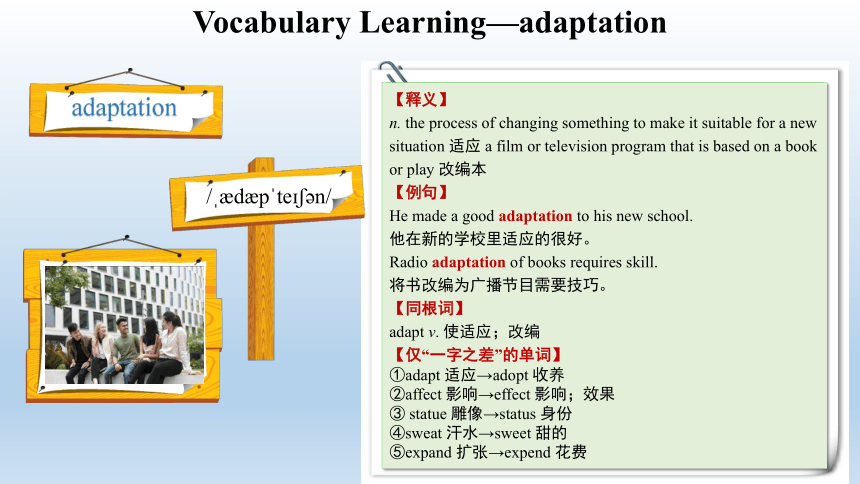
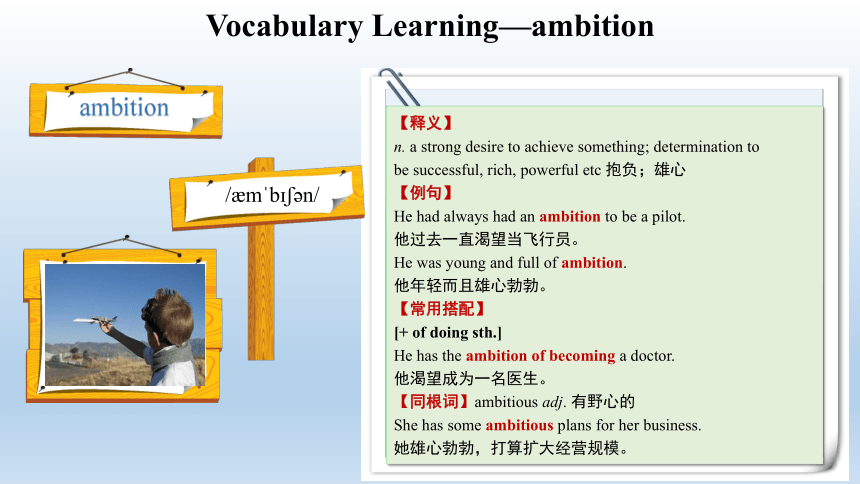
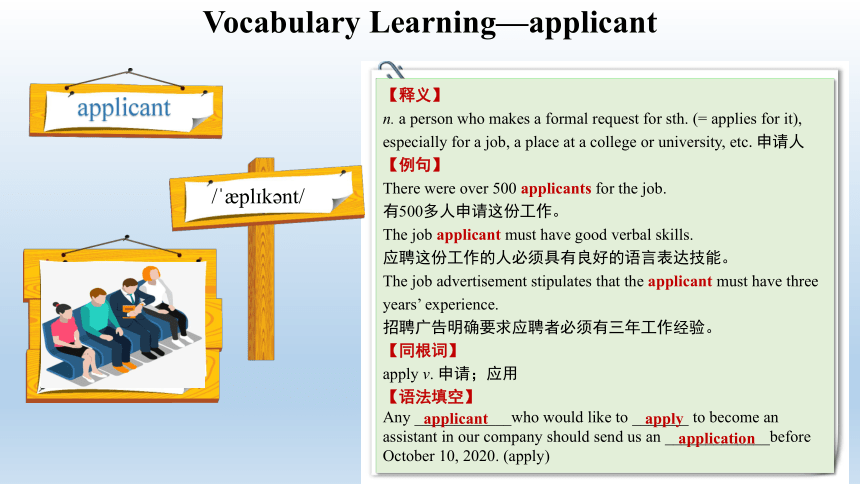
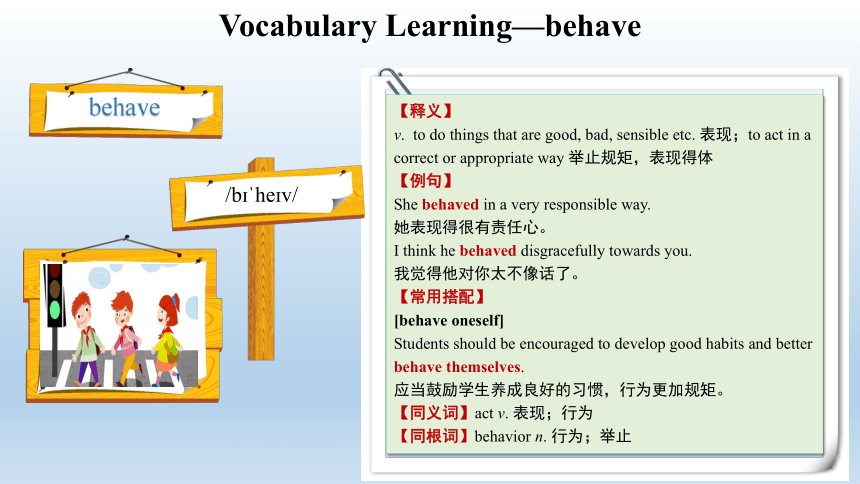
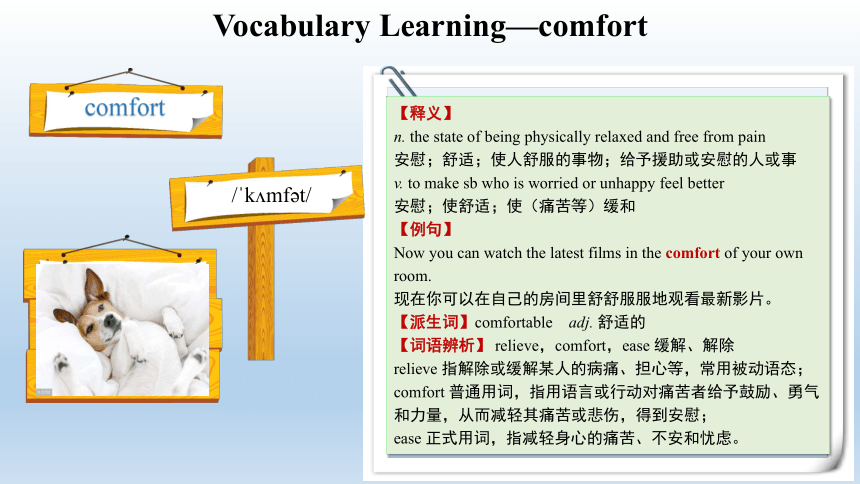
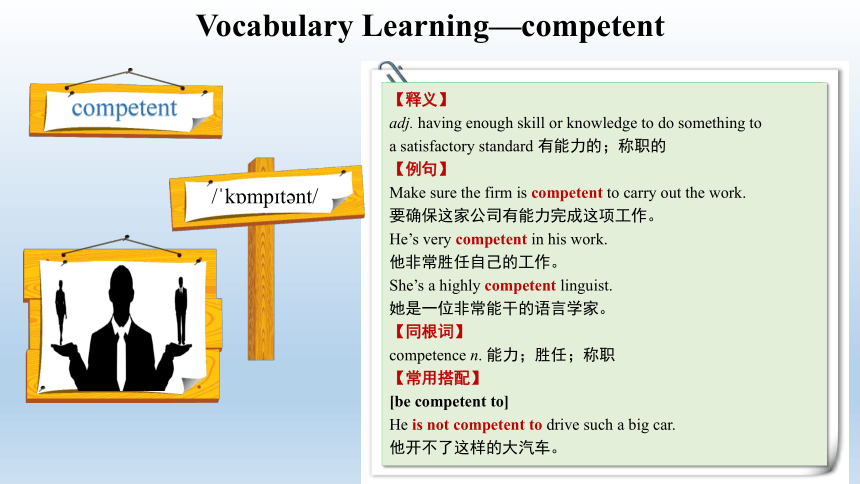

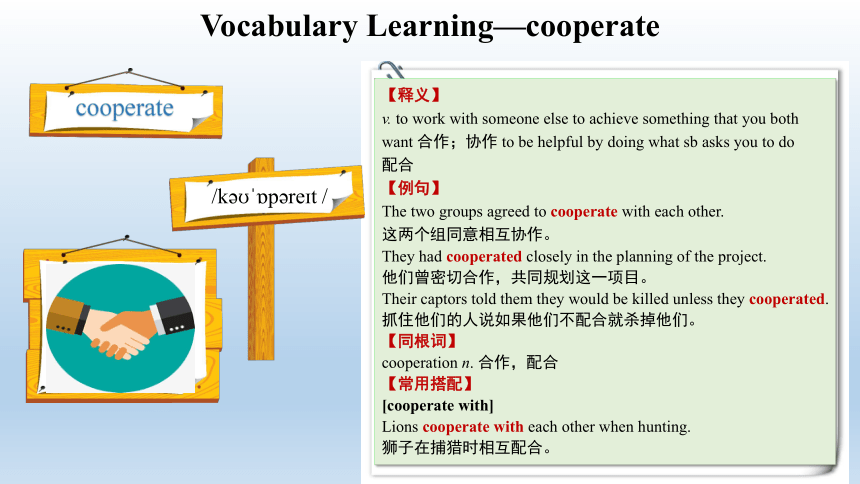
文档简介
(共21张PPT)
人教版新课标高中英语选择性必修第二册教学课件
Unit 2 Bridging cultures
Vocabulary Learning
Vocabulary Learning—adaptation
【释义】
n. the process of changing something to make it suitable for a new situation 适应 a film or television program that is based on a book or play 改编本
【例句】
He made a good adaptation to his new school.
他在新的学校里适应的很好。
Radio adaptation of books requires skill.
将书改编为广播节目需要技巧。
【同根词】
adapt v. 使适应;改编
【仅“一字之差”的单词】
①adapt 适应→adopt 收养
②affect 影响→effect 影响;效果
③ statue 雕像→status 身份
④sweat 汗水→sweet 甜的
⑤expand 扩张→expend 花费
adaptation
/ d p te n/
Vocabulary Learning—ambition
【释义】
n. a strong desire to achieve something; determination to be successful, rich, powerful etc 抱负;雄心
【例句】
He had always had an ambition to be a pilot.
他过去一直渴望当飞行员。
He was young and full of ambition.
他年轻而且雄心勃勃。
【常用搭配】
[+ of doing sth.]
He has the ambition of becoming a doctor.
他渴望成为一名医生。
【同根词】ambitious adj. 有野心的
She has some ambitious plans for her business.
她雄心勃勃,打算扩大经营规模。
ambition
/ m b n/
Vocabulary Learning—applicant
【释义】
n. a person who makes a formal request for sth. (= applies for it), especially for a job, a place at a college or university, etc. 申请人
【例句】
There were over 500 applicants for the job.
有500多人申请这份工作。
The job applicant must have good verbal skills.
应聘这份工作的人必须具有良好的语言表达技能。The job advertisement stipulates that the applicant must have three years’ experience.
招聘广告明确要求应聘者必须有三年工作经验。
【同根词】
apply v. 申请;应用
【语法填空】
Any ____________who would like to _______ to become an assistant in our company should send us an _____________before October 10, 2020. (apply)
applicant
/ pl k nt/
applicant
apply
application
Vocabulary Learning—behave
【释义】
v. to do things that are good, bad, sensible etc. 表现;to act in a correct or appropriate way 举止规矩,表现得体
【例句】
She behaved in a very responsible way.
她表现得很有责任心。
I think he behaved disgracefully towards you.
我觉得他对你太不像话了。
【常用搭配】
[behave oneself]
Students should be encouraged to develop good habits and better behave themselves.
应当鼓励学生养成良好的习惯,行为更加规矩。
【同义词】act v. 表现;行为
【同根词】behavior n. 行为;举止
behave
/b he v/
Vocabulary Learning—comfort
【释义】
n. the state of being physically relaxed and free from pain
安慰;舒适;使人舒服的事物;给予援助或安慰的人或事
v. to make sb who is worried or unhappy feel better
安慰;使舒适;使(痛苦等)缓和
【例句】
Now you can watch the latest films in the comfort of your own room.
现在你可以在自己的房间里舒舒服服地观看最新影片。
【派生词】comfortable adj. 舒适的
【词语辨析】 relieve,comfort,ease 缓解、解除
relieve 指解除或缓解某人的病痛、担心等,常用被动语态;
comfort 普通用词,指用语言或行动对痛苦者给予鼓励、勇气和力量,从而减轻其痛苦或悲伤,得到安慰;
ease 正式用词,指减轻身心的痛苦、不安和忧虑。
comfort
/ k mf t/
Vocabulary Learning—competent
【释义】
adj. having enough skill or knowledge to do something to a satisfactory standard 有能力的;称职的
【例句】
Make sure the firm is competent to carry out the work.
要确保这家公司有能力完成这项工作。
He’s very competent in his work.
他非常胜任自己的工作。
She’s a highly competent linguist.
她是一位非常能干的语言学家。
【同根词】
competence n. 能力;胜任;称职
【常用搭配】
[be competent to]
He is not competent to drive such a big car.
他开不了这样的大汽车。
competent
/ k mp t nt/
Vocabulary Learning—complex
【释义】
adj. made of many different things or parts that are connected, difficult to understand 复杂的
n. a large building with various connected rooms or a related group of buildings 综合大楼;建筑群
【例句】
This project involves a lot of complex technical problems.
这个方案牵涉到许多复杂的技术问题。
The data is complex, but we understand the structure very well.
数据是复杂的,但我们对结构的了解很充分。
【词语辨析】complex, complicated
这两个词都有“复杂的”的意思,其区别是:
complex 侧重内在关系的复杂,需通过仔细研究与了解才能掌握和运用;
complicated 与complex的含义接近,但语气更强,着重极其复杂,很难分析、分辨或解释。
complex
/ k mpleks/
Vocabulary Learning—cooperate
【释义】
v. to work with someone else to achieve something that you both want 合作;协作 to be helpful by doing what sb asks you to do
配合
【例句】
The two groups agreed to cooperate with each other.
这两个组同意相互协作。
They had cooperated closely in the planning of the project.
他们曾密切合作,共同规划这一项目。
Their captors told them they would be killed unless they cooperated.
抓住他们的人说如果他们不配合就杀掉他们。
【同根词】
cooperation n. 合作,配合
【常用搭配】
[cooperate with]
Lions cooperate with each other when hunting.
狮子在捕猎时相互配合。
cooperate
/k p re t /
Vocabulary Learning—deny
【释义】
v. to say that sth is not true 否认;否定 to refuse to allow sb to have sth that they want or ask for 拒绝
【例句】
The spokesman refused either to confirm or deny the reports.
发言人对那些报道不置可否。
It can’t be denied that we need to devote more resources to this problem.
无可否认,我们必须投入更多的资源来解决这个问题。
Access to the information was denied to them.
他们无法得到这个情报。
【同根词】
denial n. 否认;拒绝
【常用搭配】
[deny doing sth.]
Two men have denied murdering a woman at a remote picnic spot.两人否认在野餐地点谋杀了一名妇女。
deny
/d na /
Vocabulary Learning—departure
【释义】
n. the act of leaving a place 离开;启程;出发 an action that is different from what is usual or expected 背离;违反
【例句】
His sudden departure threw the office into chaos.
他的突然离去使这个部门陷入一片混乱。
His departure for France increased her sense of frustration.
他去法国这件事使她更感到失意。
It was a radical departure from tradition.
这从根本上违背了传统。
【同根词】
depart v. 离开;启程;违反
【常用搭配】
[departure from]
He refused to discuss his departure from the government.
他拒绝谈论辞去政府职 务之事。
departure
/d pɑ t /
Vocabulary Learning—dramatic
【释义】
adj. exciting or impressive 激动人心的,印象深刻的;
great and sudden 巨大而突然的,急剧的;
connected with acting or plays 戏剧的
【例句】
A superb goal by Owen earned United a dramatic victory yesterday.
昨天欧文的一个超级入球为联队赢得了激动人心的胜利。
A serious accident can have a dramatic effect on your family’s finances.
一次严重的意外事故可能会突然给家庭经济带来很大的影响。
She bought me the complete dramatic works of Brecht for my birthday.
她买了全套的布莱希特戏剧集送给我作生日礼物。
【同根词】 drama n. 戏剧;dramatically adv. 显著地
dramatic
/dr m t k/
Vocabulary Learning—engage
【释义】
vi. to take part in something 参加;从事;忙于
【例句】
Industry leaders want scientists to engage in fundamental research, not applied research.
行业领袖希望科学家从事基础性研究,而非应用性研究。【常用搭配】
[+in sth.]
The two governments have agreed to engage in a comprehensive dialogue to resolve the problem.
两国政府已经同意开展全面对话以解决该问题。
【同根词】 engaged adj. 订婚的;engagement n. 订婚
They’re engaged to be married in June.
他们订了婚,将于6月完婚。
engage
/ n ɡe d /
Vocabulary Learning—exposure
【释义】
n. when someone is in a situation where they are not protected from something dangerous or unpleasant 暴露 the action of showing the truth about someone or something, especially when it is bad 揭露 the chance to experience new ideas, ways of life etc. 体验
【例句】
Prolonged exposure to the sun can cause skin cancer.
长时间暴露在太阳下会引起皮肤癌。
The failure of their marriage has got a lot of exposure recently.
他们婚姻失败的消息最近在媒体报道很多。
【同根词】
expose v. 使接触;使体验
【常用搭配】
[exposure to]
The visit to Germany gave them exposure to the language.
此次出行德国让他们接触到了德语。
exposure
/ k sp /
Vocabulary Learning—involve
【释义】
v. if an activity or situation involves something, that thing is part of it or a result of it 包含,需要;
to include or affect someone or something 涉及,影响;
to ask or allow someone to take part in something 使某人参与
【例句】
I didn’t realize putting on a play involved so much work.
我没想到上演一部戏剧需要做这么多的工作。
These changes will involve everyone on the staff.
这些变化将影响每一位职员。
Try to involve as many children as possible in the game.
尽量让多一些孩子参与游戏。
【常用搭配】[+ doing sth.]
Running your own business usually involves working long hours.自己经营企业通常要长时间工作。
involve
/ n v lv/
Vocabulary Learning—mature
【释义】
adj. someone, especially a child or young person, who is mature
behaves in a sensible and reasonable way, as you would expect
an adult to behave 成熟的
【例句】
Girls become sexually mature earlier than boys..
女孩比男孩性成熟早。
We’re mature enough to disagree on this issue but still respect each other.
我们很成熟,尽管我们对此事意见不同,但还是很尊重对方。The human brain isn't fully mature until about age 25.
人的大脑要到 25 岁才完全发育成熟。
【表示人品质的形容词】
①elegant 高雅的 ②mature 成熟的 ③sensible 明智的
④shallow 肤浅的 ⑤modest 谦虚的 ⑥noble 高贵的
⑦generous 慷慨大方的 ⑧determined 坚毅的
mature
/m 'tju /
Vocabulary Learning—motivation
【释义】
n. the reason for the action, that which gives purpose and direction to behavior 动力,积极性;the need or reason for doing something 动机,诱因
【例句】
Without direction and motivation, a person would not know what to do.
一个人缺乏方向和动力就不知道该干些什么。
Health is my motivation for exercise.
健康是我运动的动力。
【近义词】reason n. 理由,动机;
incentive n. 动机
【同根词】
motive n. 动机,目的;
motivator n. 动力,激励因素
motivation
/ m t ve n/
Vocabulary Learning—participation
【释义】
n. the act of taking part in an activity or event 参加;参与
【例句】
We want more participation in the decision-making.
我们希望更多地参与决策。
The success of the festival depended upon the participation of the whole community.
节日活动的成功有赖于全社区的积极参与。
Their participation is subject to a number of important provisos.
他们的参与受一些重要条款的限制。
【同根词】
participate v. 参加;参与
【常用搭配】
[participation in]
A back injury prevented active participation in any sports for a while.
背部受伤使人们在一段时间内无法积极参加任何运动。
participation
/pɑ t s pe n/
Vocabulary Learning—presentation
【释义】
n. an event at which you describe or idea 报告 (观点的)陈述,说明;the act of giving someone a prize or present at a formal
ceremony 授予;颁发
【例句】
I’m going to ask each of you to make a short presentation.
我要让你们每一位作一个简短的介绍。
Dr Evans thanked him for coming to make the presentations.
埃文斯博士感谢他来颁奖。
【常用搭配】
[make/give a presentation of sth.]
He is giving a presentation of the new project.
他正在对新项目进行介绍。
【同义词】speech n. 演讲
【同根词】present v. 呈现
presentation
/ prez n te n/
Vocabulary Learning—qualification
【释义】
n. a pass of an examination or an official completion of a course, especially one conferring status as a recognizer of a profession or activity 资格,学历;a skill or type of experience that you need for a particular job or activity 资格,资历
【例句】
Jack has obtained a medical qualification.
杰克取得了行医资格证书。
What sort of qualifications do you need for the job
做这项工作需要什么资格?
【同根词】
qualify v. 取得资格,获得文凭
qualified adj. 有资格的,有文凭的
【常用搭配】
[academic qualification]
In the eyes of many people, academic qualification is a structure of basic quality.
在很多人看来,学历是基本素质。
qualification
/ kw l f ke ( )n/
Vocabulary Learning—strengthen
【释义】
vi. & vt. to become stronger or make something stronger (使)强健,加强
【例句】
Our friendship has steadily strengthened over the years.
我们的友谊逐年加深。
Repairs are necessary to strengthen the bridge.
这座桥需要加固。
【常用搭配】
[+ sth’s ties/bonds/links]
The university hopes to strengthen its ties with the local community.
这所大学希望加强和当地社区的联系。
【词缀】后缀-en常加在形容词后,表示“使变得……”,如:weaken 削弱,shorten 缩短,broaden 加宽
strengthen
/ stre θ n/
人教版新课标高中英语选择性必修第二册教学课件
Unit 2 Bridging cultures
Vocabulary Learning
Vocabulary Learning—adaptation
【释义】
n. the process of changing something to make it suitable for a new situation 适应 a film or television program that is based on a book or play 改编本
【例句】
He made a good adaptation to his new school.
他在新的学校里适应的很好。
Radio adaptation of books requires skill.
将书改编为广播节目需要技巧。
【同根词】
adapt v. 使适应;改编
【仅“一字之差”的单词】
①adapt 适应→adopt 收养
②affect 影响→effect 影响;效果
③ statue 雕像→status 身份
④sweat 汗水→sweet 甜的
⑤expand 扩张→expend 花费
adaptation
/ d p te n/
Vocabulary Learning—ambition
【释义】
n. a strong desire to achieve something; determination to be successful, rich, powerful etc 抱负;雄心
【例句】
He had always had an ambition to be a pilot.
他过去一直渴望当飞行员。
He was young and full of ambition.
他年轻而且雄心勃勃。
【常用搭配】
[+ of doing sth.]
He has the ambition of becoming a doctor.
他渴望成为一名医生。
【同根词】ambitious adj. 有野心的
She has some ambitious plans for her business.
她雄心勃勃,打算扩大经营规模。
ambition
/ m b n/
Vocabulary Learning—applicant
【释义】
n. a person who makes a formal request for sth. (= applies for it), especially for a job, a place at a college or university, etc. 申请人
【例句】
There were over 500 applicants for the job.
有500多人申请这份工作。
The job applicant must have good verbal skills.
应聘这份工作的人必须具有良好的语言表达技能。The job advertisement stipulates that the applicant must have three years’ experience.
招聘广告明确要求应聘者必须有三年工作经验。
【同根词】
apply v. 申请;应用
【语法填空】
Any ____________who would like to _______ to become an assistant in our company should send us an _____________before October 10, 2020. (apply)
applicant
/ pl k nt/
applicant
apply
application
Vocabulary Learning—behave
【释义】
v. to do things that are good, bad, sensible etc. 表现;to act in a correct or appropriate way 举止规矩,表现得体
【例句】
She behaved in a very responsible way.
她表现得很有责任心。
I think he behaved disgracefully towards you.
我觉得他对你太不像话了。
【常用搭配】
[behave oneself]
Students should be encouraged to develop good habits and better behave themselves.
应当鼓励学生养成良好的习惯,行为更加规矩。
【同义词】act v. 表现;行为
【同根词】behavior n. 行为;举止
behave
/b he v/
Vocabulary Learning—comfort
【释义】
n. the state of being physically relaxed and free from pain
安慰;舒适;使人舒服的事物;给予援助或安慰的人或事
v. to make sb who is worried or unhappy feel better
安慰;使舒适;使(痛苦等)缓和
【例句】
Now you can watch the latest films in the comfort of your own room.
现在你可以在自己的房间里舒舒服服地观看最新影片。
【派生词】comfortable adj. 舒适的
【词语辨析】 relieve,comfort,ease 缓解、解除
relieve 指解除或缓解某人的病痛、担心等,常用被动语态;
comfort 普通用词,指用语言或行动对痛苦者给予鼓励、勇气和力量,从而减轻其痛苦或悲伤,得到安慰;
ease 正式用词,指减轻身心的痛苦、不安和忧虑。
comfort
/ k mf t/
Vocabulary Learning—competent
【释义】
adj. having enough skill or knowledge to do something to a satisfactory standard 有能力的;称职的
【例句】
Make sure the firm is competent to carry out the work.
要确保这家公司有能力完成这项工作。
He’s very competent in his work.
他非常胜任自己的工作。
She’s a highly competent linguist.
她是一位非常能干的语言学家。
【同根词】
competence n. 能力;胜任;称职
【常用搭配】
[be competent to]
He is not competent to drive such a big car.
他开不了这样的大汽车。
competent
/ k mp t nt/
Vocabulary Learning—complex
【释义】
adj. made of many different things or parts that are connected, difficult to understand 复杂的
n. a large building with various connected rooms or a related group of buildings 综合大楼;建筑群
【例句】
This project involves a lot of complex technical problems.
这个方案牵涉到许多复杂的技术问题。
The data is complex, but we understand the structure very well.
数据是复杂的,但我们对结构的了解很充分。
【词语辨析】complex, complicated
这两个词都有“复杂的”的意思,其区别是:
complex 侧重内在关系的复杂,需通过仔细研究与了解才能掌握和运用;
complicated 与complex的含义接近,但语气更强,着重极其复杂,很难分析、分辨或解释。
complex
/ k mpleks/
Vocabulary Learning—cooperate
【释义】
v. to work with someone else to achieve something that you both want 合作;协作 to be helpful by doing what sb asks you to do
配合
【例句】
The two groups agreed to cooperate with each other.
这两个组同意相互协作。
They had cooperated closely in the planning of the project.
他们曾密切合作,共同规划这一项目。
Their captors told them they would be killed unless they cooperated.
抓住他们的人说如果他们不配合就杀掉他们。
【同根词】
cooperation n. 合作,配合
【常用搭配】
[cooperate with]
Lions cooperate with each other when hunting.
狮子在捕猎时相互配合。
cooperate
/k p re t /
Vocabulary Learning—deny
【释义】
v. to say that sth is not true 否认;否定 to refuse to allow sb to have sth that they want or ask for 拒绝
【例句】
The spokesman refused either to confirm or deny the reports.
发言人对那些报道不置可否。
It can’t be denied that we need to devote more resources to this problem.
无可否认,我们必须投入更多的资源来解决这个问题。
Access to the information was denied to them.
他们无法得到这个情报。
【同根词】
denial n. 否认;拒绝
【常用搭配】
[deny doing sth.]
Two men have denied murdering a woman at a remote picnic spot.两人否认在野餐地点谋杀了一名妇女。
deny
/d na /
Vocabulary Learning—departure
【释义】
n. the act of leaving a place 离开;启程;出发 an action that is different from what is usual or expected 背离;违反
【例句】
His sudden departure threw the office into chaos.
他的突然离去使这个部门陷入一片混乱。
His departure for France increased her sense of frustration.
他去法国这件事使她更感到失意。
It was a radical departure from tradition.
这从根本上违背了传统。
【同根词】
depart v. 离开;启程;违反
【常用搭配】
[departure from]
He refused to discuss his departure from the government.
他拒绝谈论辞去政府职 务之事。
departure
/d pɑ t /
Vocabulary Learning—dramatic
【释义】
adj. exciting or impressive 激动人心的,印象深刻的;
great and sudden 巨大而突然的,急剧的;
connected with acting or plays 戏剧的
【例句】
A superb goal by Owen earned United a dramatic victory yesterday.
昨天欧文的一个超级入球为联队赢得了激动人心的胜利。
A serious accident can have a dramatic effect on your family’s finances.
一次严重的意外事故可能会突然给家庭经济带来很大的影响。
She bought me the complete dramatic works of Brecht for my birthday.
她买了全套的布莱希特戏剧集送给我作生日礼物。
【同根词】 drama n. 戏剧;dramatically adv. 显著地
dramatic
/dr m t k/
Vocabulary Learning—engage
【释义】
vi. to take part in something 参加;从事;忙于
【例句】
Industry leaders want scientists to engage in fundamental research, not applied research.
行业领袖希望科学家从事基础性研究,而非应用性研究。【常用搭配】
[+in sth.]
The two governments have agreed to engage in a comprehensive dialogue to resolve the problem.
两国政府已经同意开展全面对话以解决该问题。
【同根词】 engaged adj. 订婚的;engagement n. 订婚
They’re engaged to be married in June.
他们订了婚,将于6月完婚。
engage
/ n ɡe d /
Vocabulary Learning—exposure
【释义】
n. when someone is in a situation where they are not protected from something dangerous or unpleasant 暴露 the action of showing the truth about someone or something, especially when it is bad 揭露 the chance to experience new ideas, ways of life etc. 体验
【例句】
Prolonged exposure to the sun can cause skin cancer.
长时间暴露在太阳下会引起皮肤癌。
The failure of their marriage has got a lot of exposure recently.
他们婚姻失败的消息最近在媒体报道很多。
【同根词】
expose v. 使接触;使体验
【常用搭配】
[exposure to]
The visit to Germany gave them exposure to the language.
此次出行德国让他们接触到了德语。
exposure
/ k sp /
Vocabulary Learning—involve
【释义】
v. if an activity or situation involves something, that thing is part of it or a result of it 包含,需要;
to include or affect someone or something 涉及,影响;
to ask or allow someone to take part in something 使某人参与
【例句】
I didn’t realize putting on a play involved so much work.
我没想到上演一部戏剧需要做这么多的工作。
These changes will involve everyone on the staff.
这些变化将影响每一位职员。
Try to involve as many children as possible in the game.
尽量让多一些孩子参与游戏。
【常用搭配】[+ doing sth.]
Running your own business usually involves working long hours.自己经营企业通常要长时间工作。
involve
/ n v lv/
Vocabulary Learning—mature
【释义】
adj. someone, especially a child or young person, who is mature
behaves in a sensible and reasonable way, as you would expect
an adult to behave 成熟的
【例句】
Girls become sexually mature earlier than boys..
女孩比男孩性成熟早。
We’re mature enough to disagree on this issue but still respect each other.
我们很成熟,尽管我们对此事意见不同,但还是很尊重对方。The human brain isn't fully mature until about age 25.
人的大脑要到 25 岁才完全发育成熟。
【表示人品质的形容词】
①elegant 高雅的 ②mature 成熟的 ③sensible 明智的
④shallow 肤浅的 ⑤modest 谦虚的 ⑥noble 高贵的
⑦generous 慷慨大方的 ⑧determined 坚毅的
mature
/m 'tju /
Vocabulary Learning—motivation
【释义】
n. the reason for the action, that which gives purpose and direction to behavior 动力,积极性;the need or reason for doing something 动机,诱因
【例句】
Without direction and motivation, a person would not know what to do.
一个人缺乏方向和动力就不知道该干些什么。
Health is my motivation for exercise.
健康是我运动的动力。
【近义词】reason n. 理由,动机;
incentive n. 动机
【同根词】
motive n. 动机,目的;
motivator n. 动力,激励因素
motivation
/ m t ve n/
Vocabulary Learning—participation
【释义】
n. the act of taking part in an activity or event 参加;参与
【例句】
We want more participation in the decision-making.
我们希望更多地参与决策。
The success of the festival depended upon the participation of the whole community.
节日活动的成功有赖于全社区的积极参与。
Their participation is subject to a number of important provisos.
他们的参与受一些重要条款的限制。
【同根词】
participate v. 参加;参与
【常用搭配】
[participation in]
A back injury prevented active participation in any sports for a while.
背部受伤使人们在一段时间内无法积极参加任何运动。
participation
/pɑ t s pe n/
Vocabulary Learning—presentation
【释义】
n. an event at which you describe or idea 报告 (观点的)陈述,说明;the act of giving someone a prize or present at a formal
ceremony 授予;颁发
【例句】
I’m going to ask each of you to make a short presentation.
我要让你们每一位作一个简短的介绍。
Dr Evans thanked him for coming to make the presentations.
埃文斯博士感谢他来颁奖。
【常用搭配】
[make/give a presentation of sth.]
He is giving a presentation of the new project.
他正在对新项目进行介绍。
【同义词】speech n. 演讲
【同根词】present v. 呈现
presentation
/ prez n te n/
Vocabulary Learning—qualification
【释义】
n. a pass of an examination or an official completion of a course, especially one conferring status as a recognizer of a profession or activity 资格,学历;a skill or type of experience that you need for a particular job or activity 资格,资历
【例句】
Jack has obtained a medical qualification.
杰克取得了行医资格证书。
What sort of qualifications do you need for the job
做这项工作需要什么资格?
【同根词】
qualify v. 取得资格,获得文凭
qualified adj. 有资格的,有文凭的
【常用搭配】
[academic qualification]
In the eyes of many people, academic qualification is a structure of basic quality.
在很多人看来,学历是基本素质。
qualification
/ kw l f ke ( )n/
Vocabulary Learning—strengthen
【释义】
vi. & vt. to become stronger or make something stronger (使)强健,加强
【例句】
Our friendship has steadily strengthened over the years.
我们的友谊逐年加深。
Repairs are necessary to strengthen the bridge.
这座桥需要加固。
【常用搭配】
[+ sth’s ties/bonds/links]
The university hopes to strengthen its ties with the local community.
这所大学希望加强和当地社区的联系。
【词缀】后缀-en常加在形容词后,表示“使变得……”,如:weaken 削弱,shorten 缩短,broaden 加宽
strengthen
/ stre θ n/
